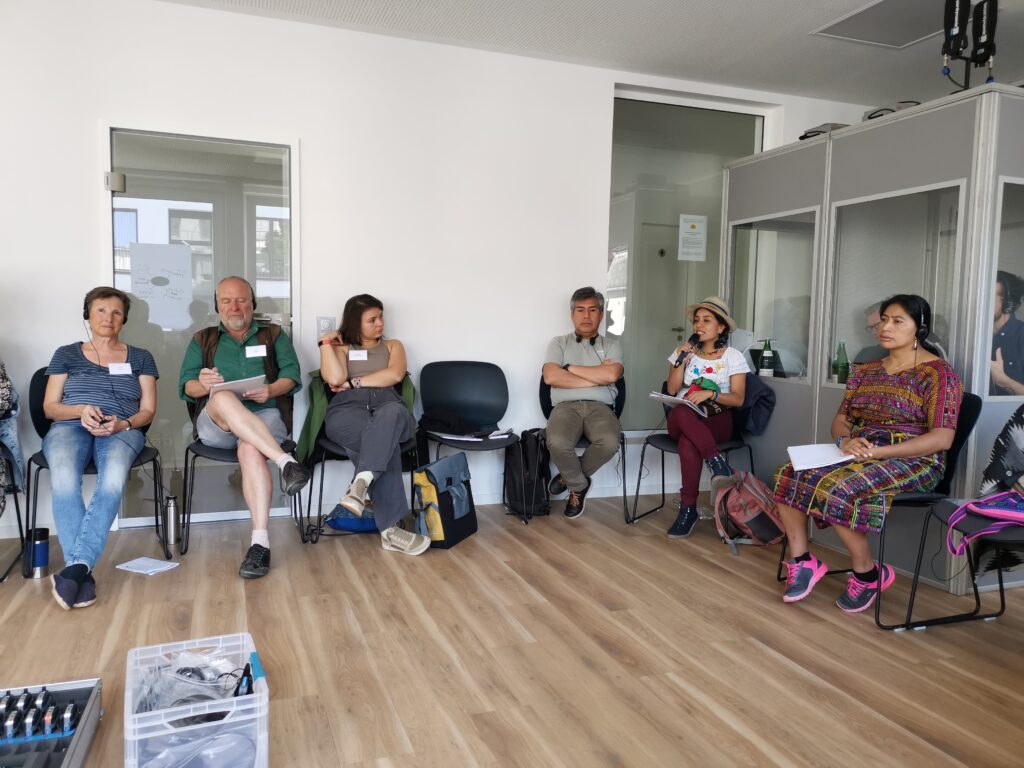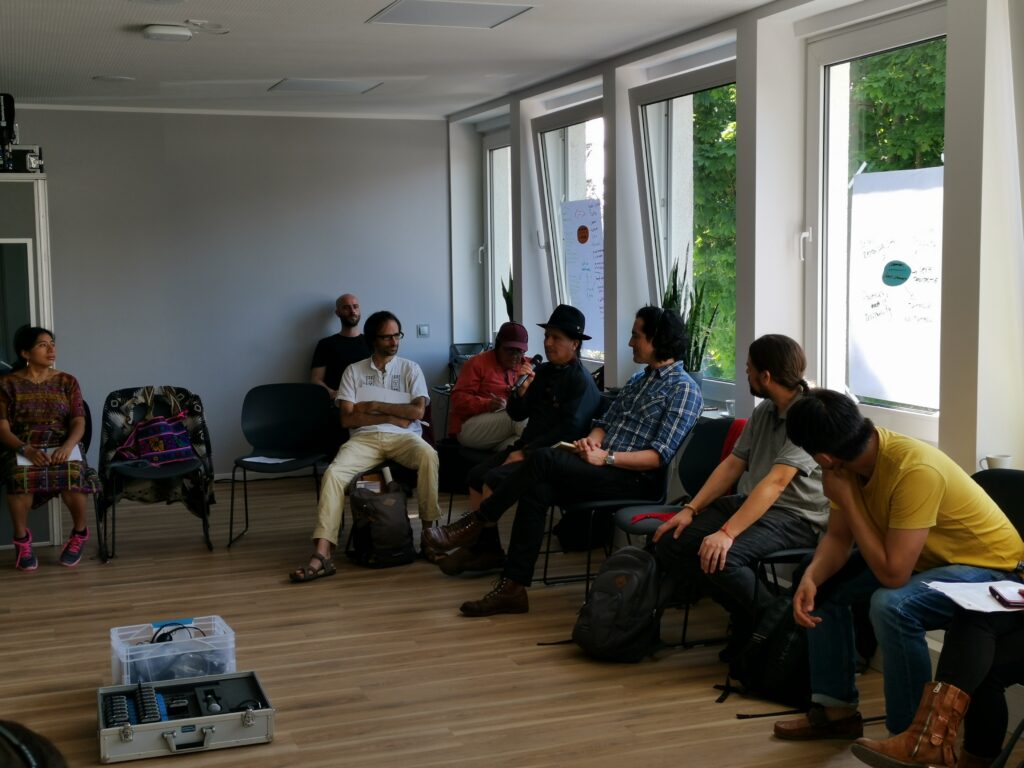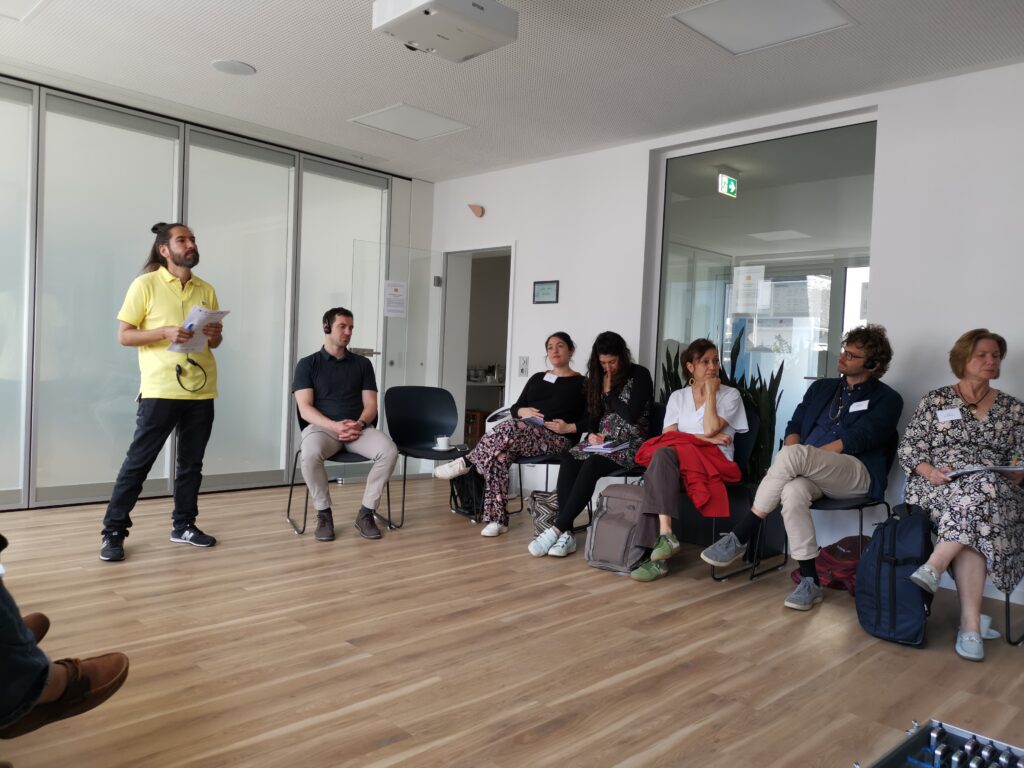By Carolina Tobón Ramírez
ZEF Senior Researchers Dr. Eva Youkhana and Dr. Dennis Avilés, ZEF Alumni Dr. Alejandro Mora-Motta, ZEF Junior Researcher Emilia Fernengel and two former Doctoral Studies Support Programme (DSSP) Postdoctoral fellows, Dr. Pablo de la Cruz and Dr. Yilson Barrera-Beltrán participated from the 20th to the 24th of May in the “Pluriversal Dialogues on Environmental Ethics: Decolonising Scientific Practice for Futures Beyond ‘Development'”, held at the Center for Life Ethics (CLE) of the University of Bonn and co-organised by ZEF. Other co-organisers were the Global Heritage Lab (GHL), the CLE, the Institute for Archaeology and Cultural Anthropology and the Interdisciplinary Centre for Latin American Studies. The event was inspired by the common interest of these research groups in decolonial perspectives and alternatives to ‘development’, especially from marginalised communities such as women and indigenous groups from the Global South. These ‘pluriversal dialogues’ are based on the idea of many and diverse worlds on the planet, each with different views and practices that need to be engaged in dialogues for sustainable and ethical futures.


These dialogues were conducted during the week through workshops and presentations in a variety of formats that deviated from the standard academic presentation format. These included the performance workshop Forum Theatre for the Pluriverse – the Magic of Acting conducted by Fritz Letschand and the Performative Workshops: Systemic Constellations and Worldwork Feeling “us and the environment” vs. “us as part of a shared world” both led by Ruth Sanders. In these workshops, different groups worked on methodologies using their own bodies, everyday experiences and relationships with ancestors. Besides, other guests from indigenous communities in Latin America also participated in these dialogues: The Amawtay Wasi experience: The process of building an indigenous university, the cosmovision and Andean pedagogy, was presented by Dr. Luis Fernando Sarango from Pluriversidad Amawtay Wasi, Ecuador, Abelardo Ramos from the Intercultural Indigenous Autonomous University of the Regional Indigenous Council of Cauca (UAIIN/CRIC) in Colombia led a workshop entitled Intercultural Translation – Reconceptualising Western Notions of Environment, Life, Ethics, from Indigenous (linguistic) perspectives, María Francisca Elías Canás from the Intercultural Bilingual School NIM NA’OJ in Guatemala presented the experience: Intercultural indigenous education in schools and shared the histories of their struggles and successes.


On the second day, the researchers from our DSSP coordination team, Eva Youkhana and Dennis Avilés, presented the ZEF and the main projects that have led to participating in these dialogues, including the DSSP. They also gave a presentation on Practices and Dialogues in the German Academy, providing an overview of the academic practices and critical perspectives related to environment and development in Germany.
On the evening of the second and third day, Yilson Barrera-Beltrán led an activity on Decolonising Scientific Practice for Futures Beyond Development. The first part was the performance of a story he had written for this particular event. The next day he invited the participants to think about their dreams after the previous evening’s performance. Many people didn’t have any specific dreams because of the story. However, they did share some thoughts about the way science is communicated and the meaning of dreams for different cultures. On the first point, some participants agreed that storytelling is a good way to communicate things, rather than the standard way scientists present facts and figures. On the second point, some of the participants from indigenous groups (e.g. Yanacona in Colombia or Mapuche in Chile) shared that dreams are related to messages from nature, their way of life or privileged information that can be interpreted through the dream that connects the physical and spiritual worlds. At the end of the activity, it was clear that different people had different interpretations of the story told by Yilson, for some it was a happy story and for others, it was close to a nightmare. “Each interpretation is different because each energy comes from your own experience”, said Eva Youkhana.


On the other hand, Pablo de la Cruz, led a performance workshop entitled Playful Methods of Detection in Participatory Research, which combined participatory methods and theatrical improvisation to show how play enriches participatory research practices. The workshop took place outside the room and participants were invited to engage in various activities to keep their attention and focus on other participants. These activities included moving the body, inventing parts of stories in groups and performing these stories. After this first part of the workshop, Pablo shared some of his experiences in developing board games as a tool for participatory research in the Amazon region of Colombia. He reflected on how he could propose new forms of interaction with the people he was doing research with. This presentation showed how it is possible to move away from the traditional tools of qualitative research or to complement them with other formats not always seen in academia, and how different groups of people (e.g. young groups) can also respond differently to these kinds of techniques and be more open to sharing information. Pablo also made it clear at the end that people’s behaviour during these kinds of games cannot always be directly related to their behaviour in everyday life, and this is an important point to take into account when doing participatory and ethnographic research.


At the end of the day, both researchers, Yilson and Pablo, led a workshop called Dialogues on the role of spirituality in weaving alternatives to the current crisis, in which they invited the participants to form two groups and in each group to discuss questions related to spirituality and the relationship with the current environmental crisis. Each participant shared their ideas about what a spiritual act could be, examples of them and how they could be linked to the environmental crisis. After the discussion, each group prepared the final reflection as a performance for the other group. In these performances, both groups presented a kind of invitation to people to relate differently to others and to nature, to not exclude people, to see the beauty and spirit of nature and the need to act together to achieve real change.
All the activities, presentations, workshops, and the whole Pluriversal Dialogues event, challenged traditional ways of doing and communicating science and suggested new formats and other questions that need to be raised in the context of the current global crisis, not only environmental but also humanitarian. We, as scientists, have an urgent responsibility to be part of the response to the challenges that humanity is now facing. We, as scientists, need to be aware that it is also important to step out of our “comfort zone” and ask uncomfortable questions, not only to others but also to ourselves. We, as scientists, are called to make a serious contribution to the necessary change.
Photos by: Aline B. Pereira
